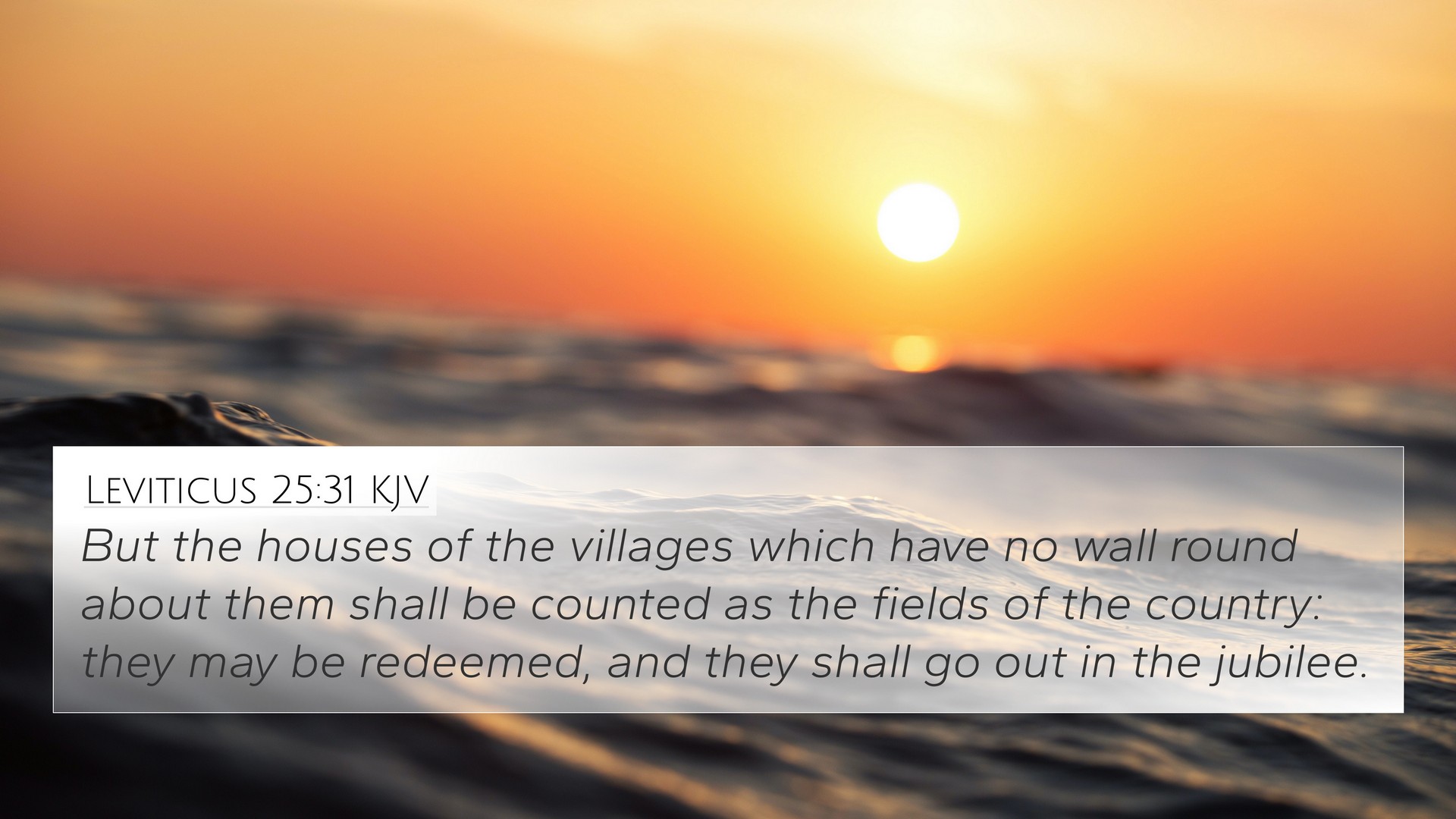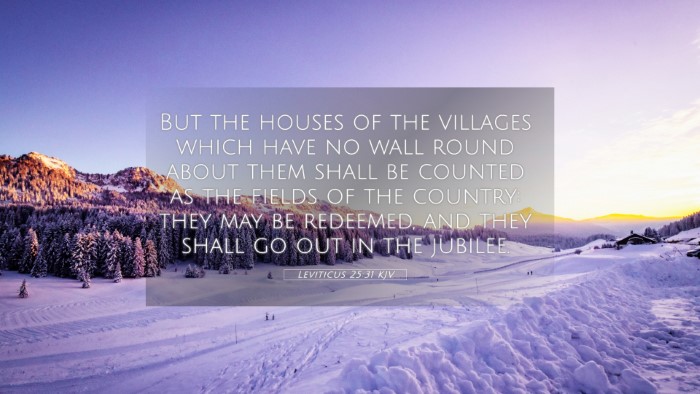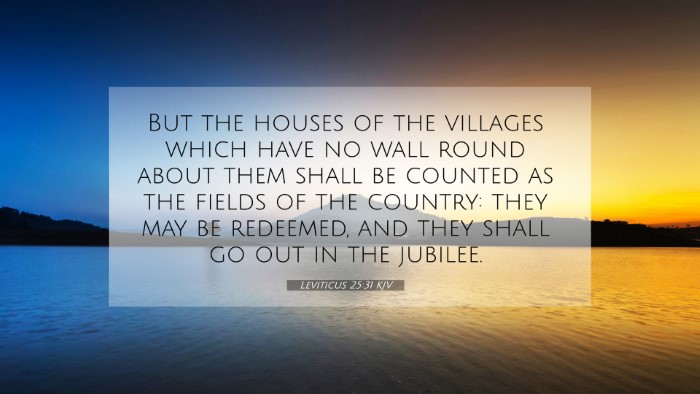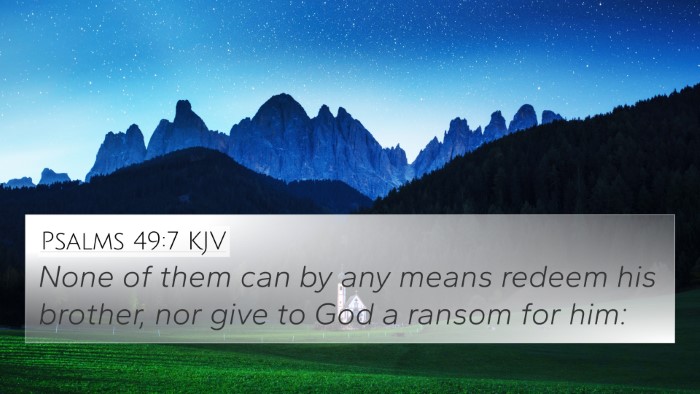Understanding Leviticus 25:31
Leviticus 25:31 states, "But the houses of the villages which have no wall round about them shall be counted as the fields of the country: they may be redeemed, and they shall go out in the jubilee." This verse presents important principles regarding property and redemption within the context of Israelite law, focusing on the value of villages and their redeemability.
Key Themes in Leviticus 25:31
- Redeemability: The redemption of houses in unwalled villages signifies the opportunity for restoration and reclaiming what is lost.
- Context of Jubilee: This verse is situated within the larger framework of the Jubilee year, highlighting God's design for economic equity and social justice.
- Value of Protection: The distinction between villages with and without walls symbolizes the importance of security and stability in one’s dwelling.
Commentary Insights
According to Matthew Henry’s Commentary, this verse emphasizes the adaptability of the law regarding property rights, suggesting that those who possess houses without walls have a different status than those with fortified homes. Houses in villages, unlike fields, can be redeemed under the structure of the Jubilee, allowing for the restoration of the original ownership.
Albert Barnes adds that the distinction implies that villages, being less secure, reflect a more transient lifestyle. The ability to redeem these homes emphasizes God's provision for his people, ensuring they always have the means to return to stability when needed. The verse assures that economic hardship does not permanently strip individuals of their rights to their property.
Adam Clarke emphasizes the significance of the jubilee period as a time when all land must return to its original owners. His reflections suggest that this law encourages a form of communal living where fairness and the right to own property are preserved, thus fostering community support during times of loss.
Cross-References and Thematic Connections
Leviticus 25:31 relates closely to several other scriptures, enriching the understanding through cross-references:
- Leviticus 25:13: Discusses the return of property during the Jubilee.
- Numbers 36:4: Explains principles regarding inheritance and land ownership.
- Isaiah 61:1-2: The announcement of good news, which reflects God's desire for restoration.
- Deuteronomy 15:2-3: Addresses the cancellation of debts and economic relief in the Jubilee year.
- Matthew 5:5: "Blessed are the meek: for they shall inherit the earth," echoing themes of possession and God’s justice.
- Luke 4:18-19: Jesus proclaims His ministry as one of liberation, resonating with the concepts found in Leviticus.
- Jeremiah 32:7-15: A story of property redemption signifying trust in God’s promises.
Inter-Biblical Dialogue
The verse invites reflection on the interconnectedness of God’s laws. When examining the background of this text, it is crucial to understand the strong emphasis on redemption and restoration woven throughout the scripture. The principles highlighted in this verse illustrate God’s overarching compassion and justice, as seen in themes deeply explored in New Testament teachings like forgiveness and reconciliation.
Conclusion and Contemporary Applications
Studying Leviticus 25:31 allows individuals to understand the balance between ownership and community support. In modern times, the insights gleaned from this scripture can apply to various discussions about property rights, social justice, and economic responsibility. Understanding the implications of redemption in the Bible invites a deeper contemplation of our responsibilities to one another as stewards of God's provisions.
Tools for Further Study
For those interested in diving deeper into Bible verse cross-referencing, consider utilizing these tools:
- Bible Concordance
- Bible Cross-Reference Guide
- Cross-Reference Bible Study Tools
- Bible Reference Resources for Sermon Preparation
- Comprehensive Bible Cross-Reference Materials
FAQs on Cross-Referencing in the Bible
As believers seek to understand scripture more fully, common questions arise:
- What verses are related to Leviticus 25:31? Many verses connect themes of redemption, justice, and community.
- How do Old and New Testament verses connect? There are numerous parallels, particularly in themes of restoration and compassion.
- How can I find cross-references in the Bible? Utilizing concordances and cross-reference tools can greatly aid this process.
Final Thoughts
Leviticus 25:31 is a critical verse that encapsulates significant themes in Biblical law and ethics. Its connections and implications resonate throughout scripture, illustrating God's unwavering commitment to justice, mercy, and restoration for His people.



